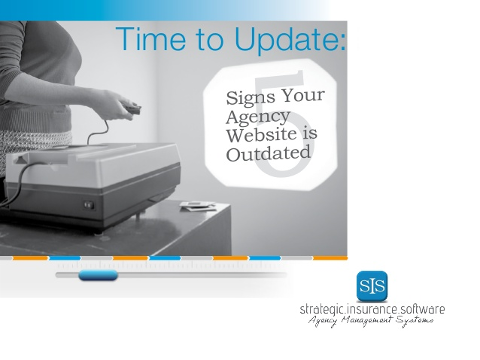
Marketing, Product Updates, Sales, Technology Trends
How old is your agency website? Do you have a
website at all?
If your answers are anything besides “Not very” and “Yes!” then it’s time for you to get working on updating or creating an insurance agency website. And one that works. Close to 40% of individuals surveyed said they would stop engaging with a site they found unattractive. Studies show it takes less than half a second for users to form an opinion about a website, so you have little time to make the critical impression that will get people to stay.
(more…)

Marketing, Technology Trends
As an independent agency owner, where do you devote most of your time and energy? Perhaps you answered “talking to customers” or “tracking new business.” Maybe you even said “marketing.” But, chances are you didn’t say “working on my agency website.”
Though your agency website may not be top of the list, it should at least be on the list. No matter how great your service or value, if no one knows your agency exists it’s all meaningless.
See four essential elements your agency website needs
How can your agency website serve as an effective mouthpiece? It must attract – and keep – attention. It must be engaging to both prospects and customers alike. An engaging agency website does the following:
1. It draws people in
Your site should catch the surfer’s eye, no matter what device they’re using. This means it’s responsive: adaptable to laptops, desktops, tablets and phones alike. The content on your homepage needs to be dynamic and easy to digest (more images than text!). Use your agency social media platforms to pull in ever-changing content, keeping your site fresh.
Do you have a responsive website? Find out why you need one
2. It keeps them reading
The content on your site should speak to viewers. Talk about what your audience wants to hear. Blogs are a great way to convey audience-friendly content. And, if you’re unsure what to write about, other agency blogs are a great source of inspiration. You can spread the work around, too. Have individuals from different departments take a stab at creating content. Multiple contributors keep your site interesting, and the different points of view draw in a larger variety of people.
3. It’s easy to navigate
One of the biggest website bounce factors is clunky navigation. If it takes users too long to find what they’re looking for, they leave. Make the most relevant info easy to find. Such info includes requesting a quote, listing your services, showing staff bios, and displaying agency contact information.
Learn more about how a client portal can benefit your agency and customers alike
4. It’s easy to find
Getting users to your website may be one of your largest hurdles. Ensure your website is included in all promotional material, business cards, and staff email signatures. Additionally, focus on boosting your rank in search. Create and execute a keyword strategy, including relevant search terms in page titles and image descriptions in your site’s metadata. Focus on local terms to decrease competition and increase impact.
Find out more on creating and executing a search strategy
Finally, make sure your agency website is uniquely you. It’s the independent nature of your agency that attracts and keeps loyal customers. Display who you are proudly and use that to your advantage.
It’s this uniqueness that draws us at SIS to serving independent agencies. We see each Partner XE agency as an individual and take pride in building and maintaining a distinct partnership. See how those partnerships take shape in our client stories or get in touch with us to find out more in person. You can reach us at [email protected] or 800.747.7005, Option 6.





